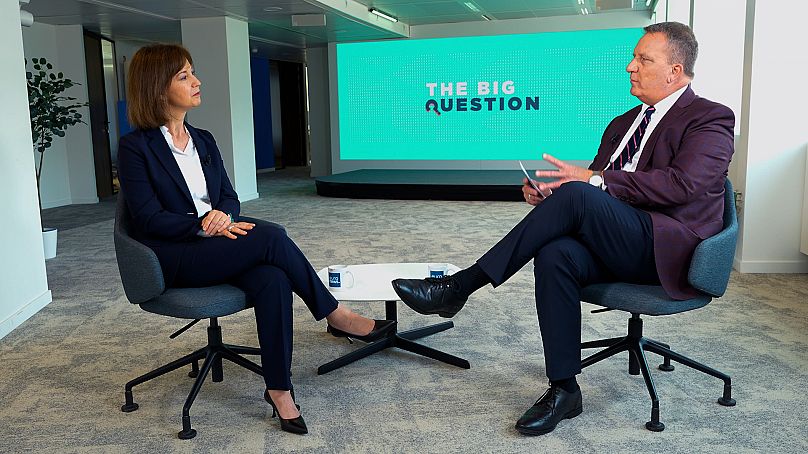Amazon is often accused of causing the decline of high street retail, but is it really that simple?
2024 saw fashion brand Esprit close 56 stores in Germany, Ted Baker shut all of its 46 stores in the UK and Ireland, and Casino Group in France (owners of Casino, Monoprix, Naturalia and Franprix) shed 768 non-profitable outlets.
Is this a sign of further closures to come? Vice President of EU stores at Amazon Mariangela Marseglia doesn’t think so. In fact, she predicts “a future where e-commerce and traditional commerce will coexist.”
“Customers are not either highstreet or e-commerce, they do both.”
In this episode of The Big Question, Marseglia joins Euronews’ Stefan Grobe to discuss the state of retail in Europe and Amazon’s impact on the industry.
Can e-commerce and high street retail coexist?
Marseglia insisted that consumers still want both online and brick-and-mortar retail options, and the industry needs to continue catering to both.
She credited online stores, like Amazon, as being a great way to source specialist or rare items which high street stores simply don’t have the space to stock.
“When I started working at Amazon, I was managing the book business,” Marseglia recalled.
“And we offered, on our infinite shelves, millions and millions of books, including foreign language books and books hard to find. And normally, these items don't find a space in a regular bookstore, so it is really complementary to traditional retail.”
Marseglia also cited UK supermarket Morrisons, who offer delivery through Amazon, and has seen it successfully coexist alongside both their physical shops and their own online delivery service.
And Marseglia seems to live by her philosophy too.
When asked where she chooses to shop on her days off, she admitted to buying many items from Amazon when she’s busy, but delights in visiting her local market in Luxembourg to buy cooking ingredients from the region of Puglia in her home country, Italy.

How are consumer shopping habits changing?
Unsurprisingly, the cost of living crisis has had an enormous impact on the way Amazon’s customers spend their money.
“What we are noticing is people being a little bit more conscious with their spending: buying more of everyday essentials, and maybe [taking their time with purchases] for goods that are more durable.”
“So instead of changing their washing machine every 10 years, it takes them a little longer. So they are postponing those types of purchases,” Marseglia added.
“They're much more interested in deals, for example. Deals events are becoming very popular, like our Prime Day or Black Friday. They tend to wait for those moments to kind of get great deals and save some money.”
Is Amazon good for Europe’s economy?
“Small and medium-sized enterprises (SMEs) are the backbone of the European economy" is the age-old phrase we hear again and again.
According to Marseglia, there are over 127,000 European SMEs thriving on Amazon.
“We are not a killer. We are actually an ally, a catalyst for their growth,” she told The Big Question.
“Thanks to a company like Amazon, their job is simplified because we allow them, for example, to export to foreign countries in a very easy way.”
Marseglia also proudly declared that Amazon contributed €41 billion to the bloc’s GDP. That’s roughly equivalent to the entire economy of Latvia or Estonia.
However, she was critical that Europe is a harder place for businesses to survive than the US.
“The US market is one big single market. In Europe, I think we should do much more to strengthen Europe as a single market because the reality is that there is a tendency towards that, but we are still operating a little bit like 27 different marketplaces,” Marseglia explained.
“We can cope with that because we are big grownup guys. But I'm much more worried for the small companies that sell on our marketplace. For them it's much more difficult to cope with complicated legislation and different regulations, et cetera.”
The Big Question is a series from Euronews Business where we sit down with industry leaders and experts to discuss some of the most important topics on today’s agenda.
Watch the video above to see the full discussion with Mariangela Marseglia.







